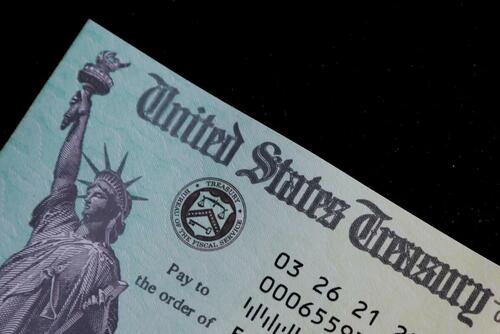
Authored by Tom Ozimek via The Epoch Times (emphasis ours),
The Internal Revenue Service (IRS) has addressed rumors that have emerged on social media claiming that a fourth round of stimulus checks will automatically go out to residents in 10 states on Nov. 30.
The rumor began after the IRS revealed on Nov. 17 that some Americans who were eligible to receive pandemic-era stimulus checks but didn't apply for them could still get the money by filing amended tax returns for 2020 and 2021 and claiming the funds through the "recovery rebate credit."
Following the IRS' announcement on Nov. 17 that some people who missed out on earlier stimulus rounds or got checks but didn't get all the money they were eligible for, a post on social media claimed that the IRS was going to send out a fourth round of stimulus checks.

The widely shared post claims that a "4th round" of "stimulus checks" is going out at the end of the month in the following 10 states: Alabama, Arizona, Maryland, New York, Virginia, Florida, Georgia, Michigan, Tennessee, and Texas.
“If your account information is on file with the IRS, you will automatically get your money deposited into the account they have on file,” reads the widely shared post. “If you received a paper check for your tax refund this year, you will get your stimulus. So if you moved & they don’t have a new address, that’s your business."
The post then went on to claim that the payments will range from $500 to $2,000 depending on the state. It also cites its purported sources as “Google & IRS.”
However, a spokesperson for the IRS said that the rumor of a fourth round of stimulus checks is false.
Anthony Burke, an IRS spokesperson, said in an emailed statement that no fourth round of stimulus checks has been authorized.
While it's true that some states listed in the social media post will be issuing tax-related payments in the coming weeks and months, these are unrelated to pandemic-era stimulus and involve things like Arizona's Families Tax Rebate program that provides a one-time payment of up to $750 for taxpayers with dependent children.
However, it is true that taxpayers who were eligible for pandemic-era stimulus but didn't collect—or didn't get all they were entitled to—can still apply for the stimulus cash.
Some People Can Still Get Stimulus Funds
The IRS revealed on Nov. 17 that, according to its records, some eligible individuals and families didn't end up collecting economic impact payments—also known as stimulus payments or stimulus checks—that were issued to help Americans weather the economic storm related to lockdowns and other pandemic-related restrictions.
In 2020 and 2021, the federal government issued $931 billion in stimulus payments, but some people never received those payments, even though they were eligible.
The IRS clarified that those who missed out can still collect the money through the "recovery rebate credit."
This is a refundable credit that either reduces the amount of taxes owed, is included in a tax refund, or is simply paid out by the IRS to eligible taxpayers if—after claiming the credit—it turns out they overpaid on their taxes.
The IRS said that the deadline to claim the 2020 credit is May 17, 2024, while the one for claiming the 2021 credit is April 15, 2025.
Who Is Eligible?
While the vast majority of those eligible for COVID-19-related relief have already received or claimed it, some people haven't—even though they're entitled to it.
Others may have received less than the full stimulus payment they were entitled to, and in their case, claiming a recovery rebate credit would top-up to the full stimulus payment amount they're entitled to.
In order to claim the 2020 and 2021 recovery rebate credits, a taxpayer must meet several criteria.
For the 2020 credit, they must have been a citizen of the United States or a U.S. resident alien in 2020. Also, they must not have been a dependent of another taxpayer for 2020 and possess a valid Social Security number issued before the due date of the tax return that is valid for employment in the United States.
For the 2021 recovery rebate credit, eligibility criteria include being a U.S. citizen or U.S. resident alien in 2021, not being a dependent of another taxpayer for 2021, and having a Social Security number issued by the due date of the tax return.
Alternatively, for the 2021 credit, a person can claim a dependent with a Social Security number issued by the due date of the tax return or claim a dependent with an Adoption Taxpayer Identification Number.
Also, it's noteworthy that the 2020 recovery rebate credit can be claimed for someone who passed away in 2020, while both the 2020 and 2021 credits can be claimed for someone who passed away in 2021 or later.
How to Apply?
In order to claim the recovery rebate credit, taxpayers must first file a tax return—even if they didn't have any income from a job, business or other source.
To claim the 2020 recovery rebate credit, individuals must file a tax return (or amend one already filed) for the 2020 tax year. The deadline to do so is May 17, 2024.
For the 2021 recovery rebate credit, the deadline for filing (or amending) a tax return is April 15, 2025.
In order to figure the amount of the recovery rebate credit on a tax return, it's necessary to know the amount of any stimulus payments received (if any), including plus-up payments.
People can use their IRS Online Account to see if they received any stimulus payments and, if they did, how much they received.
Some people received partial stimulus payments for the 2020 and 2021 tax years, and this will reduce the amount they're now eligible to collect as part of the recovery rebate credit.
More details about how to calculate the credit for a 2020 tax return can be found here, while further information about calculating the credit for a 2021 tax return is here.
One thing to note is that money received as part of the recovery rebate credit can't be counted as income when determining the ability of someone to be eligible for federal benefits like Supplemental Security Income (SSI), Supplemental Nutrition Assistance Program (SNAP), Temporary Assistance for Needy Families (TANF) and the Special Supplemental Nutrition Program for Women, Infants, and Children (WIC).
The Government Accountability Office (GAO) found that people who don't normally file tax returns, first-time filers, mixed immigrant status families, and those experiencing homelessness were among the most likely to have missed getting stimulus payments.
The Associated Press contributed to this report.
Authored by Tom Ozimek via The Epoch Times (emphasis ours),
The Internal Revenue Service (IRS) has addressed rumors that have emerged on social media claiming that a fourth round of stimulus checks will automatically go out to residents in 10 states on Nov. 30.
The rumor began after the IRS revealed on Nov. 17 that some Americans who were eligible to receive pandemic-era stimulus checks but didn’t apply for them could still get the money by filing amended tax returns for 2020 and 2021 and claiming the funds through the “recovery rebate credit.”
Following the IRS’ announcement on Nov. 17 that some people who missed out on earlier stimulus rounds or got checks but didn’t get all the money they were eligible for, a post on social media claimed that the IRS was going to send out a fourth round of stimulus checks.

The widely shared post claims that a “4th round” of “stimulus checks” is going out at the end of the month in the following 10 states: Alabama, Arizona, Maryland, New York, Virginia, Florida, Georgia, Michigan, Tennessee, and Texas.
“If your account information is on file with the IRS, you will automatically get your money deposited into the account they have on file,” reads the widely shared post. “If you received a paper check for your tax refund this year, you will get your stimulus. So if you moved & they don’t have a new address, that’s your business.”
The post then went on to claim that the payments will range from $500 to $2,000 depending on the state. It also cites its purported sources as “Google & IRS.”
However, a spokesperson for the IRS said that the rumor of a fourth round of stimulus checks is false.
Anthony Burke, an IRS spokesperson, said in an emailed statement that no fourth round of stimulus checks has been authorized.
While it’s true that some states listed in the social media post will be issuing tax-related payments in the coming weeks and months, these are unrelated to pandemic-era stimulus and involve things like Arizona’s Families Tax Rebate program that provides a one-time payment of up to $750 for taxpayers with dependent children.
However, it is true that taxpayers who were eligible for pandemic-era stimulus but didn’t collect—or didn’t get all they were entitled to—can still apply for the stimulus cash.
Some People Can Still Get Stimulus Funds
The IRS revealed on Nov. 17 that, according to its records, some eligible individuals and families didn’t end up collecting economic impact payments—also known as stimulus payments or stimulus checks—that were issued to help Americans weather the economic storm related to lockdowns and other pandemic-related restrictions.
In 2020 and 2021, the federal government issued $931 billion in stimulus payments, but some people never received those payments, even though they were eligible.
The IRS clarified that those who missed out can still collect the money through the “recovery rebate credit.”
This is a refundable credit that either reduces the amount of taxes owed, is included in a tax refund, or is simply paid out by the IRS to eligible taxpayers if—after claiming the credit—it turns out they overpaid on their taxes.
The IRS said that the deadline to claim the 2020 credit is May 17, 2024, while the one for claiming the 2021 credit is April 15, 2025.
Who Is Eligible?
While the vast majority of those eligible for COVID-19-related relief have already received or claimed it, some people haven’t—even though they’re entitled to it.
Others may have received less than the full stimulus payment they were entitled to, and in their case, claiming a recovery rebate credit would top-up to the full stimulus payment amount they’re entitled to.
In order to claim the 2020 and 2021 recovery rebate credits, a taxpayer must meet several criteria.
For the 2020 credit, they must have been a citizen of the United States or a U.S. resident alien in 2020. Also, they must not have been a dependent of another taxpayer for 2020 and possess a valid Social Security number issued before the due date of the tax return that is valid for employment in the United States.
For the 2021 recovery rebate credit, eligibility criteria include being a U.S. citizen or U.S. resident alien in 2021, not being a dependent of another taxpayer for 2021, and having a Social Security number issued by the due date of the tax return.
Alternatively, for the 2021 credit, a person can claim a dependent with a Social Security number issued by the due date of the tax return or claim a dependent with an Adoption Taxpayer Identification Number.
Also, it’s noteworthy that the 2020 recovery rebate credit can be claimed for someone who passed away in 2020, while both the 2020 and 2021 credits can be claimed for someone who passed away in 2021 or later.
How to Apply?
In order to claim the recovery rebate credit, taxpayers must first file a tax return—even if they didn’t have any income from a job, business or other source.
To claim the 2020 recovery rebate credit, individuals must file a tax return (or amend one already filed) for the 2020 tax year. The deadline to do so is May 17, 2024.
For the 2021 recovery rebate credit, the deadline for filing (or amending) a tax return is April 15, 2025.
In order to figure the amount of the recovery rebate credit on a tax return, it’s necessary to know the amount of any stimulus payments received (if any), including plus-up payments.
People can use their IRS Online Account to see if they received any stimulus payments and, if they did, how much they received.
Some people received partial stimulus payments for the 2020 and 2021 tax years, and this will reduce the amount they’re now eligible to collect as part of the recovery rebate credit.
More details about how to calculate the credit for a 2020 tax return can be found here, while further information about calculating the credit for a 2021 tax return is here.
One thing to note is that money received as part of the recovery rebate credit can’t be counted as income when determining the ability of someone to be eligible for federal benefits like Supplemental Security Income (SSI), Supplemental Nutrition Assistance Program (SNAP), Temporary Assistance for Needy Families (TANF) and the Special Supplemental Nutrition Program for Women, Infants, and Children (WIC).
The Government Accountability Office (GAO) found that people who don’t normally file tax returns, first-time filers, mixed immigrant status families, and those experiencing homelessness were among the most likely to have missed getting stimulus payments.
The Associated Press contributed to this report.
Loading…





